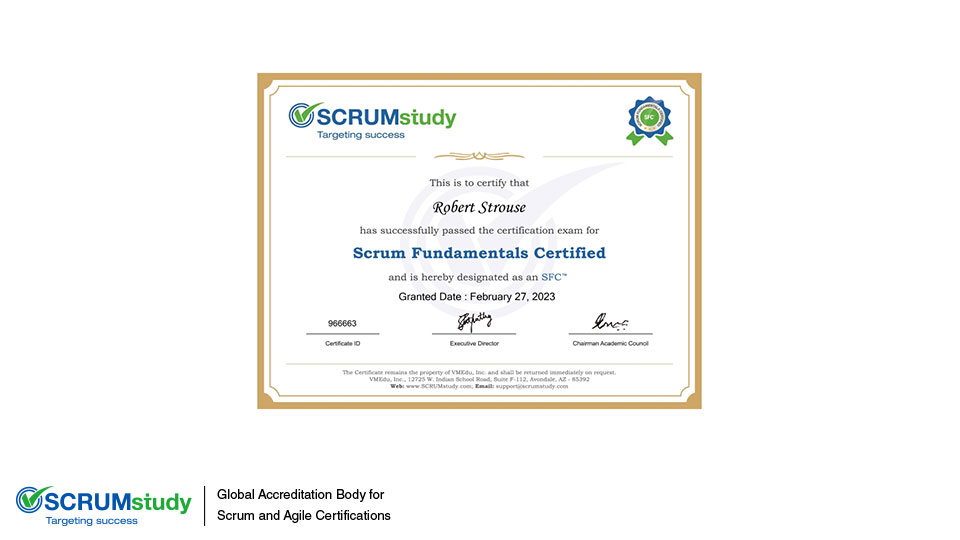What types of questions and topics should candidates expect on the Scrum Master certification training exam, and what strategies can be employed to effectively prepare for and pass the exam?
Posted by SCRUMstudy® on August 06, 2024
Categories: Agile Certification SBOK® Guide Scrum Scrum Guide Scrum Master Training
Scrum training online exams are typically the final step in earning certification and validating proficiency in Scrum methodologies. These exams assess participants' understanding of key Scrum principles, roles, events, and artifacts covered during the training. Online exams are often structured as multiple-choice or scenario-based assessments, designed to evaluate practical knowledge and application of Scrum practices in various scenarios. Participants can take these exams remotely, providing flexibility in scheduling while ensuring a secure testing environment. Successful completion of the online exam validates individuals' skills and knowledge, enabling them to confidently apply Scrum principles in their roles as Scrum Masters, Product Owners, or team members within Agile teams.
Agile Scrum training online exams are designed to assess and certify individuals in the principles and practices of Scrum, an agile framework for managing complex projects. These exams typically cover various aspects of Scrum, including roles, events, artifacts, and the values that underpin effective Scrum implementation. The SBOK Guide, or Scrum Body of Knowledge, serves as a comprehensive resource for understanding these components, providing a structured approach to learning and applying Scrum methodologies. Online training programs often include interactive modules, practice exams, and real-world scenarios to ensure that candidates are well-prepared for the certification exam. By successfully completing the Agile Scrum online exam, professionals demonstrate their ability to apply Scrum principles effectively in their projects, enhancing their ability to deliver high-quality results in a collaborative and iterative manner.
We will attempt to do a quick overview of some of the Scrum certifications that are currently being offered.
Next, let's discuss how to choose the right Scrum trainer. While it can be beneficial to find a Scrum trainer with a similar background to yours, it is not an absolute requirement. The framework and style of Scrum training can vary from trainer to trainer, so it's important to find one that matches your learning style.
The biggest positive of a formal Scrum training is that you learn everything in a controlled environment. You meet people who are also there to learn about Scrum and in case you have common background, it helps to understand the process and difficulties of implementation from outsider’s point of view. A formal training also helps you understand about the mistake which you may make due to the traditional project management concepts rooted in you.
The main purpose of any certification is to impart a common baseline of the knowledge. These Scrum certifications, compared to any other project management certifications have a very easy test. You should remember that getting a Scrum certificate is way easier than the implementing actual Scrum framework.
Scrum and Agile methodologies offer significant flexibility in implementation. However, it's crucial to maintain the core principles of the process. Project managers who modify essential elements of Scrum are often referred to as "Scrumbut." It is generally recommended to adopt Scrum in its entirety initially to fully understand its mechanics. Once you have a solid grasp of the framework, you can then make informed decisions about potential adjustments. Over time, you may realize that no changes are necessary.
You need to understand that nothing is more valuable than experience. Scrum or Agile Certification may only add some credibility and marketability to the individual.
Scrum Master certification training exam
Posted by SCRUMstudy® on July 10, 2024
Categories: Agile Certification SBOK® Guide Scrum Scrum Guide Scrum Master Training
Scrum training online exams are typically the final step in earning certification and validating proficiency in Scrum methodologies. These exams assess participants' understanding of key Scrum principles, roles, events, and artifacts covered during the training. Online exams are often structured as multiple-choice or scenario-based assessments, designed to evaluate practical knowledge and application of Scrum practices in various scenarios. Participants can take these exams remotely, providing flexibility in scheduling while ensuring a secure testing environment. Successful completion of the online exam validates individuals' skills and knowledge, enabling them to confidently apply Scrum principles in their roles as Scrum Masters, Product Owners, or team members within Agile teams.
Agile Scrum training online exams are designed to assess and certify individuals in the principles and practices of Scrum, an agile framework for managing complex projects. These exams typically cover various aspects of Scrum, including roles, events, artifacts, and the values that underpin effective Scrum implementation. The SBOK Guide, or Scrum Body of Knowledge, serves as a comprehensive resource for understanding these components, providing a structured approach to learning and applying Scrum methodologies. Online training programs often include interactive modules, practice exams, and real-world scenarios to ensure that candidates are well-prepared for the certification exam. By successfully completing the Agile Scrum online exam, professionals demonstrate their ability to apply Scrum principles effectively in their projects, enhancing their ability to deliver high-quality results in a collaborative and iterative manner.
We will attempt to do a quick overview of some of the Scrum certifications that are currently being offered.
Next, let's discuss how to choose the right Scrum trainer. While it can be beneficial to find a Scrum trainer with a similar background to yours, it is not an absolute requirement. The framework and style of Scrum training can vary from trainer to trainer, so it's important to find one that matches your learning style.
The biggest positive of a formal Scrum training is that you learn everything in a controlled environment. You meet people who are also there to learn about Scrum and in case you have common background, it helps to understand the process and difficulties of implementation from outsider’s point of view. A formal training also helps you understand about the mistake which you may make due to the traditional project management concepts rooted in you.
The main purpose of any certification is to impart a common baseline of the knowledge. These Scrum certifications, compared to any other project management certifications have a very easy test. You should remember that getting a Scrum certificate is way easier than the implementing actual Scrum framework.
Scrum and Agile methodologies offer significant flexibility in implementation. However, it's crucial to maintain the core principles of the process. Project managers who modify essential elements of Scrum are often referred to as "Scrumbut." It is generally recommended to adopt Scrum in its entirety initially to fully understand its mechanics. Once you have a solid grasp of the framework, you can then make informed decisions about potential adjustments. Over time, you may realize that no changes are necessary.
You need to understand that nothing is more valuable than experience. Scrum or Agile Certification may only add some credibility and marketability to the individual.
Scrum Master certification training exams
Posted by SCRUMstudy® on July 09, 2024
Categories: Agile Certification Scrum Training
Scrum Master certification training exams, such as those offered by SCRUMstudy.com (Certified ScrumMaster or SMC), are designed to assess and validate an individual's understanding of Scrum principles, practices, and roles. These exams typically cover key topics such as the Scrum framework, roles and responsibilities within a Scrum team, events like sprints and daily stand-ups, and artifacts like product backlogs and sprint backlogs. Certification training often includes interactive workshops, real-world case studies, and practice exams to prepare candidates thoroughly. Earning a Scrum Master certification demonstrates a solid grasp of Agile methodologies and enhances one's ability to facilitate effective Scrum practices within teams and organizations.
The Scrum Master Certification (SMC™) is designed to equip individuals with the expertise to effectively manage and lead Scrum practices. This certification differentiates itself by focusing on the skills necessary for overseeing Scrum teams and ensuring the successful implementation of Scrum principles within a project. Unlike other certifications, which might concentrate on broader project management methodologies, the SMC™ emphasizes practical, hands-on skills specific to the Scrum framework.
Preparing for the Scrum Master certification exam requires a structured and focused approach to ensure success. To effectively prepare for the exam, aspiring Scrum Masters should start by thoroughly understanding the Scrum framework, principles, roles, and responsibilities. Engaging in practical experience by participating in Scrum projects or simulations can significantly enhance one's understanding and application of Scrum practices. Additionally, leveraging resources such as study guides, practice exams, and online courses provided by SCRUMstudy can help candidates familiarize themselves with exam formats, question types, and key concepts.
Building confidence for the Scrum Master certification exam is crucial for success, and leveraging practice exams can significantly contribute to this. According to SCRUMstudy, these mock exams provide a realistic exam experience, allowing candidates to familiarize themselves with the format and types of questions they will encounter. Regular practice on these platforms helps in identifying areas of strength and pinpointing topics that require further study, thereby improving overall preparedness. Additionally, the immediate feedback and detailed explanations of answers enable learners to understand the rationale behind correct responses, fostering a deeper comprehension of Scrum principles and practices. This comprehensive preparation boosts confidence, ensuring candidates are well-equipped to tackle the certification exam effectively.
Professional Scrum Master certification training exam
Posted by SCRUMstudy® on June 25, 2024
Categories: Agile Certification Scrum Training
The Scrum Master Certified (SMC) certification training exam is a crucial component that evaluates participants' understanding of Scrum principles and their ability to apply them in practical scenarios. The exam typically consists of multiple-choice questions and is designed to assess knowledge of Scrum roles, events, artifacts, and Agile values. To prepare for the exam, participants often engage in mock tests, quizzes, and practice exams provided during the training. Successful completion of the SMC certification exam demonstrates proficiency in Agile project management and validates one's capability to effectively lead Scrum teams and promote Agile practices within their organization.
The Scrum Master Certification (SMC™) is designed to equip individuals with the expertise needed to manage and lead Scrum practices effectively. This certification differentiates itself by focusing on the skills necessary for overseeing Scrum teams and ensuring the successful implementation of Scrum principles within a project. Unlike other certifications, which might concentrate on broader project management methodologies, the SMC™ emphasizes practical, hands-on skills specific to the Scrum framework.
Responsibilities of a Scrum Master
Based on the principles outlined in the SBOK™ Guide, the SMC™ certification emphasizes the importance of:
- Facilitating Scrum Processes: Ensuring that Scrum practices are followed by the team and removing any obstacles that may hinder their progress.
- Effective Communication: Engaging with stakeholders, team members, and the Product Owner to ensure transparency, manage expectations, and facilitate clear communication throughout the project.
- Team Coordination: Encouraging collaboration among team members and ensuring that everyone is working towards the same goals.
- Continuous Improvement: Promoting a culture of continuous improvement within the team by facilitating retrospectives and encouraging the adoption of best practices.
- Prioritization: Assisting the Product Owner in maintaining a clear and prioritized Product Backlog, ensuring the team is always working on the most valuable tasks.
SCRUMstudy's Scrum Master certification online exam offers a comprehensive and accessible pathway for professionals seeking to validate their expertise in Scrum methodology. The exam is designed to rigorously assess a candidate's knowledge and understanding of key Scrum principles, practices, and roles, ensuring they are well-equipped to lead Scrum teams effectively. With a focus on practical application, the online format provides flexibility, allowing candidates to schedule and complete the exam at their convenience. This makes it an ideal option for busy professionals aiming to advance their careers without disrupting their work schedules. Successfully passing the SCRUMstudy Scrum Master certification exam signifies a high level of proficiency and commitment to Agile practices, enhancing the professional's credibility and opportunities in the competitive job market.


